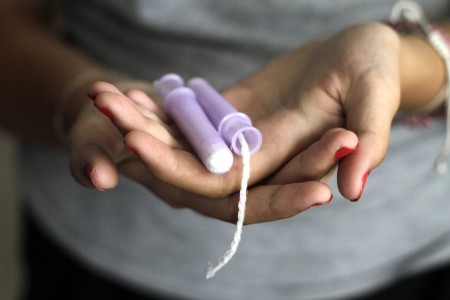
Advertisements
Bacterial vaginosis (BV) is just one of the many unpleasant conditions that people with vaginas can experience, but it's especially annoying when it's recurring. BV that keeps coming back could be connected to your sex life, hygiene routine or something else.
Video of the Day
The vagina contains many bacterial organisms that help keep it healthy, says Jodie Horton, MD, urogynecologist and chief advisor for Love Wellness. But if that bacterial balance goes out of whack, BV can happen.
"The most dominant bacteria are lactobacilli, which help maintain a healthy vaginal pH between 3.8 to 4.5 and keep the organisms in balance," Dr. Horton says. "BV occurs when lactobacilli decreases and there's an overgrowth of bacteria called Gardnerella vaginalis or Prevotella."
And BV is a common condition for people with vaginas who are of reproductive age — in fact, it may affect as many as 50 percent of people assigned female at birth (AFAB), according to the National Institutes of Health.
Fortunately, you can take steps to prevent and treat it. Here's everything you need to know about the condition, including how you get BV, why it can recur and how to prevent it.
Tip
Managing your stress levels, practicing safe sex, wearing breathable underwear and simplifying your vaginal hygiene routine can all help reduce recurring BV.
Symptoms of BV
Some people with vaginas may not experience any discomfort from BV, while other people may deal with a variety of symptoms, per the Mayo Clinic.
Here are some of the most common signs of the condition:
- Thin, gray, white or green vaginal discharge
- Foul-smelling or fishy vaginal odor
- Vaginal itching
- Burning during urination
BV in Men
BV is a condition unique to people with vaginas. But some research suggests that people with penises can spread BV or other bacterial infections to partners who have vaginas.
For instance, a December 2013 study in Sexually Transmitted Diseases found that people assigned male at birth with a history of an inflammatory urethra condition (called nongonococcal urethritis) were more likely to carry BV-causing bacteria on their penises.
Bacterial Vaginosis Causes
So, how do you get bacterial vaginosis? Here are common causes of the condition (and the potential reasons why you keep getting BV infections):
Advertisements
1. Your Vaginal Hygiene Routine Is Too Complicated
A vaginal hygiene routine with too many or the wrong products can affect your pH balance and lead to an infection. Really, all you need is water to clean this area of your body.
"Feminine hygiene products like soaps, douching and sprays can change the pH of the vagina and [lead to] an overgrowth of bacteria, causing vaginal infections like bacterial vaginosis," Dr. Horton says.
Fix it: Dr. Horton recommends stripping down your vaginal hygiene routine. Here are her tips:
- Avoid products with perfumes and dyes
- Use a pH-balanced cleanser or water to wash your vulva
- Avoid douching, because the vagina is self-cleaning
2. Sexual Activity
BV isn't a sexually transmitted infection, but it typically occurs in people with vaginas who are sexually active, according to the Centers for Disease Control and Prevention. And having multiple sexual partners or a new sexual partner can increase your chances of getting BV.
Research has also shown that you can have recurring BV with the same partner. Indeed, a small March 2016 study of 35 people AFAB in PLOS One noted that those who had sex with the same partner before and after treatment for BV were two to three times more likely to experience BV again.
However, larger studies are needed to better establish this link.
Oral sex has also been linked to an increased risk of BV. According to an August 2020 study in PLOS Biology, BV-causing bacteria can be transferred via saliva into the vagina.
Fix it: This doesn't mean you have to deprive yourself of sex — rather, remember to prioritize safety.
For instance, using condoms every time you have sex and limiting the amount of sexual partners you have can help lower your chances of recurring BV infections, per the New York State Department of Health.
You can also use dental dams and condoms on sex toys if you are having sex with a partner who also has a vagina.
It's also important to be mindful of the link between semen and BV. Semen can alter the pH level in your vagina and contribute to a higher rate of bacteria growth, according to the Mayo Clinic.
3. You're Stressed Out
Yes, you read that right — stress can cause BV.
High levels of the stress hormone cortisol can negatively affect your overall wellbeing, which includes vaginal health. This physical stress can throw your vaginal pH levels out of balance, which can lead to BV, per Stony Brook Medicine.
Fix it: Managing your stress may help you avoid health issues like BV. To help, try techniques such as:
- Deep breathing
- Practicing gratitude
- Using meditation apps
- Exercising
- Eating nutrient-rich foods that nourish you






